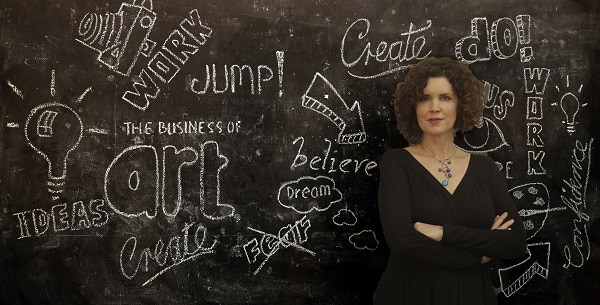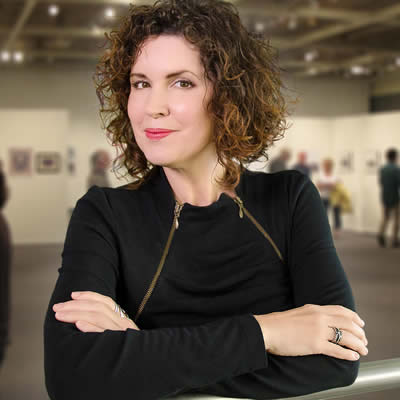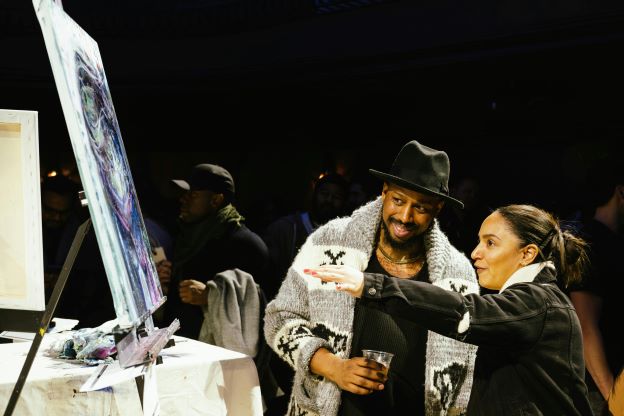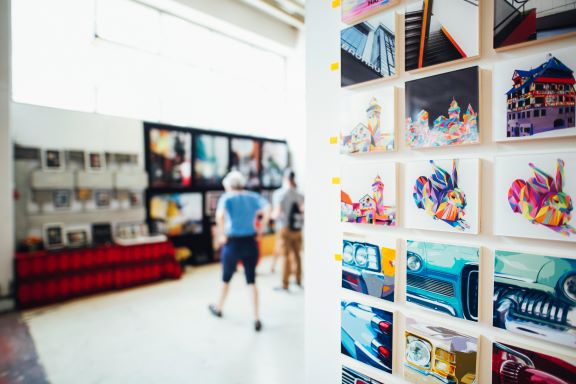The 13th in our art business series with artist and art business expert, Crista Cloutier, who has been coaching other artists around the world on all aspects of their business via her program: The Working Artist.

If you’re an artist, you already know how important it is to keep learning. Curiosity is the artist’s calling card, and devotion to craft is what separates the professionals from the dilettantes.
But don’t stop at the fun stuff. Taking workshops to learn new techniques or perfect old ones is important, but making the investment in an artist coach, someone who can guide you toward the best professional practices for you, is crucial if you want to make your living as an artist.
Now, this is where a lot of artists say to me, “I don’t need to work with an artist’s coach, I’m going to find an agent to do all that business and marketing stuff for me.” And then I sigh and explain that the art business doesn’t work like that.
Artist agents, whether they are a gallery, a broker, or an old-fashioned agent, don’t want to be your mommy. They don’t want to work with someone who doesn’t understand the business, who doesn’t already have a proven track-record, and they certainly don’t want to have to take care of you.
Artist agents want to sell art, and they want to work with someone who understands professional responsibilities; how to create the proper marketing materials, how to best show work, how to talk about it, how to handle finances, and someone who can make educated decisions about social media and online marketing. And the best way I know to achieve this knowledge is to work with an artist’s coach.
Artist Coaches
Artist coaches abound and they are a wonderful resource for anyone who wants to take their career to the next level. You can find artist coaches online or sometimes even within your community. Many artist coaches have worked as gallerists, curators, or even as an artist who’s achieved a certain level of success. The choices are vast, but do your research. Don’t choose an artist’s coach because he’s cheap or famous or making huge promises. Choose someone whose values and interests and approach jive with yours.

Some artists say to me, “I don’t need an artist’s coach. I can just google the information I need.” Yes, you can. But that doesn’t mean that the information is right. You get what you pay for.
I recently met a young man who was advertising himself as an artist’s coach. I asked about his credentials and he told me that he didn’t have any. He’d studied art in school, become a graphic designer, but now wanted to find a way to make money so he could go back to making art. Becoming an artist’s coach was how he decided to do it.
I asked where he got the information he was selling – and his reply: “The internet.”
That said; there are some wonderful artist coaches available.
I myself am an artist’s coach too. I work through a program I’ve developed called The Working Artist.
I describe The Working Artist as “everything they never taught in art school” because for some reason, they don’t. Yes, they’ll show you how to make work but they don’t teach you how to sell it, how to get your art seen and sold, how to price art, negotiate with galleries, use social media professionally, or create a marketing plan.
Most art schools today do students a real disservice by not preparing them for the business of art. So this is where an artist coach can really help.
My own background is quite different from the other artist coaches that I listed above. I’ve worked in nearly every aspect of the art business. I’ve been an artist’s agent. I’ve run a gallery and a nationally renowned studio. I’ve been an arts broker, selling art to galleries and museums and I’ve personally sold millions of dollars of art over my career. I’ve collaborated with world-famous artists and those fresh out of school and completely unknown. I’ve curated exhibitions that have toured the world. I’ve produced award-winning documentaries about art. I’ve published books and articles. I’m certified as a fine arts appraiser. And I’m a working artist myself.
Selling Art Is Not “Selling Out” and Other Wisdom from an Artist’s Coach
Art is communication. Art needs to be seen to be art. Otherwise, it’s just paint on canvas. So part of your job, as an artist, is to get your work seen, to get your work engaged in that conversation.
Whether you want to make a financial profit from your work or not is a personal choice. But if you are going to call yourself an artist, then you need to get eyes on your work. And when it comes to strategizing how to do this, planning is better than hoping.
Try using your own creativity to plot your career. But DO plot your career — don’t just keep sending the same feeble email to galleries and hoping for the best. If something didn’t work for you, use the energy that you might normally spend beating yourself up or cursing the art world to ask yourself why it didn’t work, and then do better the next time. Use every setback as an opportunity to learn and grow.
Refuse to feel shame, it will only hold you back. Shame and creativity make a lethal cocktail. Name a good idea that’s ever come from shame? You can’t.
I always say that ideas are an artist’s currency. The same way that bankers deal in money, that’s how artists deal in ideas. So you cannot afford to feel shame. It will shut your imagination right down. So when you fall down, wipe the blood from your knees, figure out why you fell, and get right back up again. A good artist’s coach will help you to set your new course and inspire you to keep going.
Try to think outside the gallery/museum mindset. That is such a narrow road, and it’s very, very crowded. I’m not saying that isn’t available to you, but I am saying that there is a bigger world out there for your art if the old-fashioned way isn’t working. There are all kinds of ways to make a living from your creativity. There are all kinds of ways to engage your art with other people.
Your artist’s coach will work with you to really look at your art and ask yourself, “Who am I as an artist? What’s my work really about? Who’s my ideal audience? Where will I find them?” And brainstorm ways that you can market your work directly to them in a different way.
A Community of Artists
An artist’s coach will give you guidance and inspiration. But don’t expect your artist’s coach to do all the work for you. You have to put the work in being a working artist! And part of that work includes participating in an artist community.
Other artists are not your competition. Other artists are your best friends. Other artists will know how to solve your technical challenges. Other artists will understand your frustrations and cheer your accomplishments. Other artists will fill the gallery when you have a show because they are the only ones who will really understand how much work has gone into each piece. Other artists are more likely to know people or situations that can help you. Other artists are going through the exact same career challenges that you are, or they have in the past, or they will in the future. Be as generous as you can with your colleagues, and you will reap the rewards tenfold.
To Go to Grad School or Not to Go to Grad School
As an artist’s coach, I get a lot of questions about graduate school. Is grad school the ticket to success? It is not.
Graduate school is expensive and time-consuming. It may help you to develop your work faster than if you worked on your own. It will provide you with valuable connections and introduce your work to a broader audience. But very few art schools and very few graduate programs provide artist career information. They are much more focused on the work itself. So it is really a personal decision as to whether or not taking on the expense of additional education is worth it to you right now. It is important to clearly understand what you will be receiving and what you will not.
This is why my tagline for The Working Artist reads, “It’s everything they never taught in art school.” Because even if you went to grad school, you’re going to have to turn elsewhere for career information. Again, this is where working with an artist’s coach can really propel you forward professionally.
There Are Resources
Again, don’t count on your artist’s coach to do the research for you. It’s important that you have your finger on the pulse of what information exists and what’s relevant to you. A good artist’s coach will point you in the right direction and educate you about the options.
A lot of information can be found through your local arts councils and you should consider signing up for their newsletters and studying them seriously. There, you will find calls for submission for public arts projects, grants, and other opportunities. Your state may even have an artist registry, which is well worth looking into.
Another great resource for artist opportunities is the Foundation Center (foundationcenter.org). This is the leading online source of philanthropic information and they maintain lists of artist grants and fellowships. These are well worth your consideration, not only because of the apparent benefits of funding, but winning awards make fabulous lines on your resume and provide incredible networking opportunities
In the end, there is support and information out there for artists and photographers who are serious about their career. Waiting for someone else to do your work will not serve you. Life is too short and the competition too fierce. If you want people to invest in your art, start by making an investment in yourself. And the investment that I recommend is working with an artist’s coach.

Guest Author: Crista Cloutier
Crista Cloutier has been actively involved in the contemporary art world throughout her career. Having worked as an international art dealer, curator, and gallerist, Crista is now the founder of The Working Artist, an online business school for visual artists.
Honored as an “Influencer in the Contemporary Art World” by LinkedIn, Crista’s work has helped artists in over 80 different countries to exhibit and sell more art.
What’s Next?
Did you:
- Have follow-up questions?
- Have other related thoughts that might be beneficial to the community?
Post them in the comments!
Are You a Visual Artist?
Get the art catalog app and connected, maintenance-free website your art business deserves. Forever Free & Pro versions.
Are You an Art Collector?
You’ll have access to a marketplace of global artists and phenomenal tools to organize your art collection. Forever Free & Pro versions.
You Might Also Enjoy…

Elevating Your Profile: Harnessing the Power of Reviews for Artists

Amplifying Your Art’s Reach: Harnessing the Power of Physical Backlinks

Mastering the Art Sales Funnel: Transforming Strangers into Buyers


